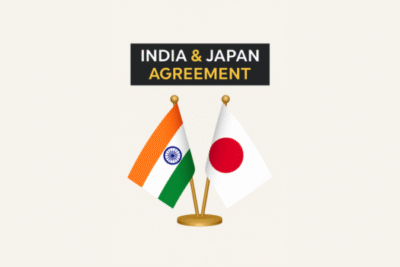
Prime Minister Narendra Modi’s two-day official visit to Japan (August 29–30) has concluded with a landmark set of agreements and initiatives aimed at deepening the India–Japan Special Strategic and Global Partnership. The visit, hosted by Japanese Prime Minister Shigeru Ishiba, produced a comprehensive package of 13 key agreements and several notable outcomes, spanning defense, economy, technology, environment, and cultural cooperation.
Major Outcomes of the Visit
1. India–Japan Joint Vision for the Next Decade
A 10-year strategic roadmap covering eight priority areas: economic partnership, economic security, mobility, ecological sustainability, technology and innovation, health, people-to-people, and state–prefecture engagements.
2. Joint Declaration on Security Cooperation
A comprehensive framework to evolve bilateral defense and security cooperation to address contemporary regional and global challenges.
3. Action Plan for Human Resource Exchange
A plan to facilitate two-way exchange of 500,000 people, including 50,000 skilled and semi-skilled Indian workers to Japan within the next five years.
4. MoC on Joint Crediting Mechanism
Designed to promote decarbonizing technologies, Japanese investments in India, and contribute to India’s greenhouse gas reduction goals.
5. MoU on Digital Partnership 2.0
Focuses on advancing cooperation in digital public infrastructure, digital talent development, and joint R&D in AI, IoT, and semiconductors.
6. MoC on Mineral Resources
Strengthening supply chain resilience for critical minerals, including exploration, mining, processing technologies, and stockpiling efforts.
7. ISRO–JAXA Implementing Arrangement
Defines cooperation on the Joint Lunar Polar Exploration Mission (Chandrayaan-5), marking a milestone in Indo-Japanese space collaboration.
8. Joint Declaration on Clean Hydrogen and Ammonia
Commitment to joint research, investments, and projects in hydrogen and ammonia-based energy technologies.
9. MoC on Cultural Exchange
Promotes collaboration in art, museums, exhibitions, and cultural preservation.
10. MoU on Decentralized Wastewater Management
Encourages reuse and decentralized management of wastewater, addressing public health and environmental protection.
11. MoC on Environmental Cooperation
Enabling framework for collaboration on pollution control, climate change, waste management, biodiversity, and environmental technologies.
12. MoU between Sushma Swaraj Institute of Foreign Service and Japan’s MOFA
Enhances exchanges between diplomats, academics, and researchers to strengthen mutual understanding on foreign policy.
13. Joint Statement of Intent on Science and Technology
Expands cooperation in science and research, including exchange of scientists, institutional partnerships, and startup involvement.
Other Notable Announcements
-
Private Investment Target: Japan committed JPY 10 trillion in private investment into India over the next decade.
-
Economic Security Initiative: A framework to boost supply chain resilience in semiconductors, clean energy, telecom, pharmaceuticals, critical minerals, and emerging technologies. An Economic Security Fact Sheet was issued as a reference.
-
India–Japan AI Initiative: Collaboration in large language models, training, capacity building, and support for startups to build a trustworthy AI ecosystem.
-
Next-Generation Mobility Partnership: To promote G2G and B2B cooperation in railways, aviation, roads, shipping, and ports, with an emphasis on Make-in-India mobility solutions.
-
SME Forum: Launch of the India–Japan SME Forum to strengthen cooperation between the two countries’ small and medium enterprises.
-
Sustainable Fuel Initiative: Promoting biogas, biofuels, energy security, and farmer livelihoods, while supporting R&D in sustainable fuels.
-
High-Level State–Prefecture Exchanges: Commitment to organize three visits in each direction between Indian states and Japanese prefectures.
-
Regional Business Forums: Establishment of business forums with Kansai and Kyushu to foster business, cultural, and people-to-people ties.
A Defining Moment in Bilateral Relations
With this comprehensive set of agreements, India and Japan have outlined a clear vision for the coming decade, expanding cooperation in areas ranging from defense and critical minerals to AI, semiconductors, sustainable fuels, and cultural exchange. The visit reaffirms the strength of the Special Strategic and Global Partnership and sets the stage for deeper engagement between governments, businesses, and people of both nations.




COMMENTS